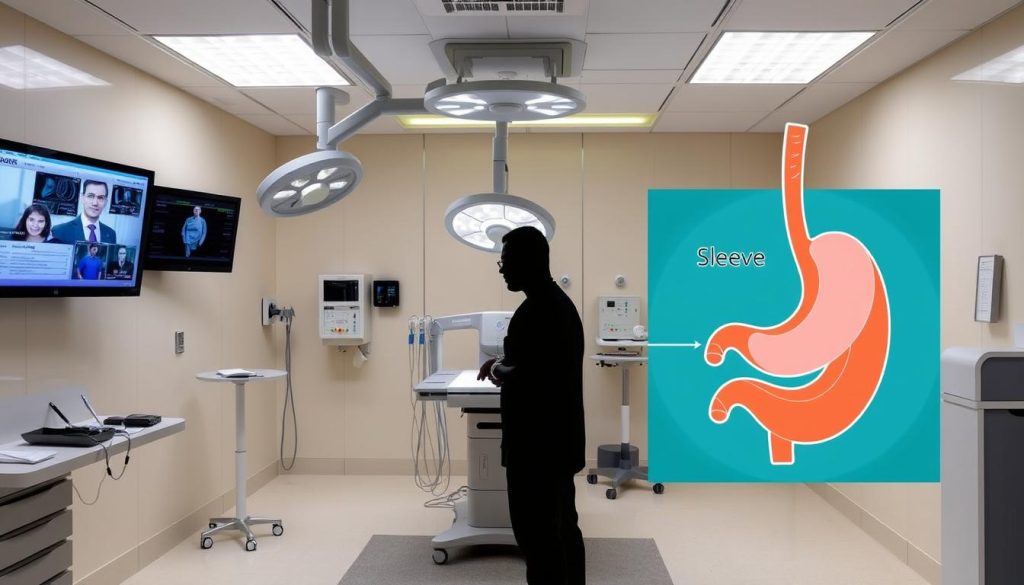Sleeve surgery, also known as gastric sleeve surgery, is a top choice for weight loss. It’s a modern way to lose a lot of weight and get healthier.
This surgery makes your stomach smaller to control how much you eat. This guide will cover the main points of sleeve surgery. It will also talk about its benefits and why it’s popular.
Learning about sleeve surgery is key for those thinking about weight loss surgery. This introduction will help you understand more about the procedure. It’s a step towards making a smart choice for your weight loss journey.
Understanding Sleeve Surgery: A Modern Weight Loss Solution
Sleeve surgery is now a top choice for weight loss. It’s a modern way to help those with severe obesity.
Definition and Basic Principles
Vertical sleeve gastrectomy is a surgery that cuts the stomach by 80%. What’s left is a tube-like stomach. This limits how much food you can eat and lowers hunger hormones. It leads to big weight loss and better health.

Evolution of Bariatric Surgery
Bariatric surgery has evolved a lot. Old procedures were complex and dangerous. Sleeve gastrectomy changed things for the better. It’s now a safe and effective way to treat obesity on its own.
Key Benefits of Sleeve Surgery
Sleeve surgery has many benefits for those fighting obesity:
- Significant weight loss
- Improved health from obesity
- No intestines rerouting needed
- Shorter hospital stay
- Less risk of nutrient problems
These points make sleeve surgery a great choice for many. It’s safe and effective for treating severe obesity.
Medical Conditions Treated by Gastric Sleeve Surgery
Gastric sleeve surgery is a form of metabolic surgery. It helps those with severe obesity and related health issues. This surgery aids in weight loss and treats various medical conditions.

Obesity treatment through gastric sleeve surgery can lead to significant improvements in several health conditions:
- Type 2 Diabetes: Many patients experience better blood sugar control or even remission.
- Hypertension: Blood pressure often normalizes after surgery.
- Sleep Apnea: Symptoms may reduce or disappear entirely.
- Heart Disease: Risk factors decrease substantially.
- Joint Pain: Less weight means reduced stress on joints.
The impact of gastric sleeve surgery goes beyond weight loss. It’s a powerful tool in treating metabolic disorders. It also improves overall quality of life.
| Condition | Improvement Rate | Time Frame |
|---|---|---|
| Type 2 Diabetes | 80% | 3-6 months |
| Hypertension | 70% | 6-12 months |
| Sleep Apnea | 85% | 3-9 months |
| Heart Disease Risk | 65% | 12-24 months |
These improvements show how effective gastric sleeve surgery is. It’s not just for weight loss but also for metabolic surgery. Patients often feel more energetic, happier, and have better overall well-being after surgery.
The Science Behind Vertical Sleeve Gastrectomy
Vertical sleeve gastrectomy is a surgery that changes how the body loses weight. It works by changing the digestive system. This leads to big weight loss and better health.

Anatomical Changes
In this surgery, doctors take out about 80% of the stomach. What’s left is a narrow tube. This tube holds less food, helping you eat less and feel full sooner.
Hormonal Impact
The surgery also changes how your body feels hunger. Ghrelin, the “hunger hormone,” goes down a lot after surgery. This means you’ll want to eat less and stick to your diet better.
Metabolic Effects
Vertical sleeve gastrectomy also changes how your body uses energy. It makes your body better at using insulin, which can help with diabetes. It also changes how your body handles blood sugar and fats.
| Effect | Impact |
|---|---|
| Stomach Size | Reduced by 80% |
| Ghrelin Levels | Significantly decreased |
| Insulin Sensitivity | Improved |
| Diabetes Resolution | Common within 1-2 years |
Understanding the science behind vertical sleeve gastrectomy shows why it’s effective. It changes your body’s structure, hormones, and metabolism. This makes it a powerful way to lose weight and get healthier.
Qualifying Criteria for Sleeve Surgery
Sleeve surgery is a big step for those fighting obesity. Not everyone can get this surgery. It’s for those who really need it and can get the most benefit.
BMI Requirements
Body Mass Index (BMI) is very important for getting sleeve surgery. You usually need a BMI of 40 or higher. If your BMI is between 35 and 39.9, you might qualify if you have health problems linked to obesity.

Health Conditions
Some health issues can help you qualify for sleeve surgery. These include:
- Type 2 diabetes
- High blood pressure
- Sleep apnea
- Heart disease
Even with a lower BMI, you might get surgery if you have these conditions.
Psychological Evaluation
A mental health check is key to qualify for sleeve surgery. It makes sure you’re ready for the big lifestyle changes. It looks at things like:
- Eating disorders
- Depression
- Substance abuse
- Ability to follow post-surgery guidelines
This step is very important for success after surgery.
Just meeting these criteria doesn’t mean you’ll get surgery. Every case is different. A medical team will carefully look at each one. They want the best results for everyone who wants this surgery.
Pre-operative Preparation and Assessment
Getting ready for gastric sleeve surgery is a detailed process. It makes sure patients are ready for this big change. The journey starts with medical tests and checks.

Blood tests, heart checks, and talks with nutritionists are key. These steps find any risks and make the surgery fit each patient’s needs.
Changing your lifestyle is also important before surgery. You might need to eat differently and start exercising. These actions help with surgery success and long-term health.
Weight loss surgery is a team effort. Your commitment to pre-operative preparation is as important as the skill of your surgeon.
A team of doctors, nutritionists, and mental health experts help you. They make sure you’re ready physically and mentally for what’s coming.
| Pre-operative Step | Purpose | Typical Timeframe |
|---|---|---|
| Medical Tests | Assess overall health | 1-2 months before surgery |
| Nutritional Counseling | Prepare for post-surgery diet | 3-6 months before surgery |
| Psychological Evaluation | Ensure mental readiness | 1-3 months before surgery |
| Lifestyle Changes | Improve surgical outcomes | 3-6 months before surgery |
Knowing and following these steps is vital for weight loss surgery. It prepares you for a successful surgery and a healthier life.
The Surgical Procedure: Step-by-Step
Vertical sleeve gastrectomy is a complex surgery that needs precision and skill. Let’s look at the main steps in this stomach reduction surgery.
Anesthesia and Initial Steps
The surgery starts with general anesthesia. Once the patient is asleep, the team gets the belly ready. They make small cuts for the laparoscopic tools.
Laparoscopic Technique
Laparoscopic sleeve gastrectomy uses tiny cameras and tools through the cuts. This method cuts down on scars and quickens healing. The surgeon uses these tools to reach the stomach.
Stomach Reduction Process
In the surgery, about 80% of the stomach is taken out. The left part is made into a tube. This new stomach limits food and changes hormone levels, helping with weight loss.
“Laparoscopic sleeve gastrectomy is a transformative procedure that not only reduces stomach size but also impacts the body’s metabolic processes.”
The whole laparoscopic sleeve gastrectomy takes 60 to 90 minutes. After, patients are watched in the recovery room as they start their weight loss journey.
Recovery Timeline and Post-operative Care
After gastric sleeve surgery, patients start a detailed recovery plan. This plan begins in the hospital, where doctors watch over them closely. They manage pain and keep an eye on vital signs. Patients usually stay for 1-3 days before going home to heal further.
The first week is all about rest and taking care of the wound. Patients eat only liquids and then move to pureed foods. Walking is encouraged to prevent blood clots and help with healing. By week two, most can do light activities and start eating soft foods.
Four to six weeks later, patients can usually do normal activities again. They start eating solid foods and add exercise to their routine. It’s important to keep up with follow-up appointments with the surgeon to make sure everything is healing right.
| Recovery Phase | Diet | Activity Level |
|---|---|---|
| Week 1-2 | Clear liquids, then full liquids | Short walks, rest |
| Week 3-4 | Pureed foods | Light activities |
| Week 5-6 | Soft foods | Moderate exercise |
| Week 7+ | Regular diet | Normal activities |
Long-term success after weight loss surgery depends on sticking to dietary guidelines and attending support groups. Regular check-ups are also key. Patients must make lifelong lifestyle changes to reach and keep their weight loss goals.
Dietary Guidelines After Sleeve Surgery
After gastric sleeve surgery, patients must follow specific dietary guidelines. This helps with healing and weight loss. They start with liquids and move to solid foods gradually.
Liquid Phase
The first step is clear liquids. Patients drink water, broth, and sugar-free drinks in small amounts. This prevents dehydration and lets the stomach heal.
Soft Foods Stage
Next, they eat pureed and soft foods. This includes protein-rich foods like yogurt and cottage cheese. It’s important to control portions during this time.
Long-term Nutrition Plan
The long-term diet focuses on high-protein, low-fat foods. Patients eat small, frequent meals. This keeps energy levels steady and supports weight loss.
A typical meal plan includes:
| Meal | Food Options | Portion Size |
|---|---|---|
| Breakfast | Scrambled eggs, Greek yogurt | 1/4 cup |
| Lunch | Grilled chicken, steamed vegetables | 1/2 cup |
| Dinner | Baked fish, quinoa | 1/2 cup |
| Snacks | Protein shake, cheese stick | 1/4 cup |
Following these guidelines is key for successful weight loss and long-term health after gastric sleeve surgery.
Expected Weight Loss Results and Timeline
Sleeve surgery is a top choice for those fighting obesity. Knowing the typical weight loss timeline helps patients stay on track and motivated.
Right after surgery, patients often lose weight quickly in the first few months. This fast weight loss is both thrilling and tough as the body gets used to its new way of working.
The table below shows average weight loss percentages at important times:
| Time After Surgery | Average Excess Weight Loss |
|---|---|
| 3 months | 30-40% |
| 6 months | 50-60% |
| 1 year | 60-70% |
| 18 months | 70-80% |
Keep in mind, results can vary. Things like starting weight, age, and following post-surgery advice play big roles. Those who stick to diet plans and lifestyle changes tend to see better results over time.
As time goes on, weight loss might slow down. This is normal. The goal then shifts to keeping a healthy weight and enjoying better health overall.
Patients of sleeve surgery can also see big improvements in health issues like diabetes and high blood pressure. Regular check-ups with doctors help keep progress on track and solve any issues quickly.
Potential Risks and Complications
Sleeve surgery is a common weight loss method but comes with risks. Knowing these risks helps patients make better choices for their weight loss journey.
Short-term Risks
Right after surgery, patients might face bleeding, infections, or leaks. These problems are rare but need quick medical help. Doctors work hard to avoid these issues during the surgery.
Long-term Complications
Later on, some might face nutrient deficiencies because they eat less. Gastroesophageal reflux disease (GERD) could also happen. If patients don’t stick to their diet, they might gain weight back.
Prevention Strategies
To lower risks after surgery, patients should follow their doctor’s advice closely. Regular visits to the bariatric team are key. Staying on track with diet and lifestyle helps avoid complications and keeps weight off.
| Complication | Prevention Strategy |
|---|---|
| Nutrient Deficiencies | Take prescribed supplements |
| GERD | Eat small, frequent meals |
| Weight Regain | Maintain healthy diet and exercise |
Even with risks, sleeve surgery can be safe and effective with the right care. Talking to your doctor about any worries is important for a successful weight loss journey.
Lifestyle Changes Required for Success
Sleeve surgery is a powerful tool against obesity, but it’s not a quick fix. Success after surgery depends on big lifestyle changes. Patients must adopt a new way of living to keep their weight off and get healthier.
Eating right is key after surgery. Patients should eat foods rich in nutrients but low in calories. This means choosing lean proteins, fruits, veggies, and whole grains over fatty and sugary foods. It’s also important to control how much you eat, as your stomach is smaller now.
Exercise is another must after sleeve surgery. It helps burn calories, build muscle, and increase your metabolism. Aim for at least 150 minutes of moderate exercise each week. As you get stronger, you can increase the intensity of your workouts.
- Develop a healthy relationship with food
- Learn new coping mechanisms for emotional eating
- Incorporate regular physical activity into daily life
- Attend support groups and ongoing counseling
Changing your behavior is also vital for lasting success. Many find support groups and counseling helpful. These resources offer guidance and motivation as you work to lose weight.
Remember, sleeve surgery is just the start of a lifelong journey to health. By making these lifestyle changes, patients can get the most out of their surgery and achieve lasting results.
Cost and Insurance Coverage
Understanding the costs of sleeve surgery is key for those thinking about it. Prices vary based on location and medical needs.
Average Procedure Costs
Gastric sleeve surgery costs between $15,000 and $25,000 in the U.S. This includes pre-op checks, the surgery, and post-op care. Some clinics offer deals that include follow-up and nutrition advice.
| Cost Component | Estimated Range |
|---|---|
| Surgery | $10,000 – $20,000 |
| Pre-op Tests | $1,500 – $3,000 |
| Post-op Care | $3,500 – $6,000 |
Insurance Requirements
Many insurances cover sleeve surgery, but rules differ. Patients must show they’ve tried to lose weight and have obesity-related health issues. Some insurers want a diet program before they approve the surgery.
Financing Options
For those without full insurance, there are financing options. These include medical loans, hospital payment plans, and healthcare credit cards. Some choose medical tourism for cheaper options, but it has its own risks.
Planning the financial side of weight loss surgery is as vital as preparing for the surgery. Talk to your healthcare team and insurance about your options. This helps make informed choices for your weight loss journey.
Comparing Sleeve Surgery to Other Bariatric Procedures
Vertical sleeve gastrectomy is becoming a popular choice for weight loss surgery. Let’s look at how it compares to other common bariatric surgeries. This will help us see its unique benefits and drawbacks.
Gastric bypass and adjustable gastric banding are also well-known bariatric surgeries. Each has its own way of helping patients lose weight.
| Procedure | Weight Loss Potencial | Reversibility | Nutrient Absorption |
|---|---|---|---|
| Vertical Sleeve Gastrectomy | 60-70% excess weight loss | Not reversible | Minimal impact |
| Gastric Bypass | 70-80% excess weight loss | Difficult to reverse | Significant impact |
| Adjustable Gastric Banding | 40-50% excess weight loss | Reversible | No impact |
Sleeve surgery strikes a balance between being effective and simple. It doesn’t reroute the intestines like gastric bypass. This reduces the risk of some complications. It also doesn’t involve a foreign device like gastric banding, which lowers the risk of device-related problems.
The right bariatric surgery depends on many factors. These include BMI, medical history, and personal preferences. Patients should talk to their healthcare provider. This will help them choose the best option for their weight loss journey.
Long-term Success Stories and Statistics
Sleeve surgery has changed lives for many. Studies show that people who get gastric sleeve surgery keep losing weight for 5-10 years. They often lose 60-70% of their extra weight in the first few years and keep it off.
Gastric sleeve surgery also improves health. Patients see better blood pressure, cholesterol, and diabetes symptoms. Some even stop having type 2 diabetes. These health gains, along with weight loss, greatly improve life quality.
Success after sleeve surgery depends on lifestyle changes. Those who follow new diets, exercise, and see doctors for check-ups do best. While problems like weight gain or nutritional issues can happen, with the right care, patients can stay healthy and keep their gains.
FAQ
Q: What is sleeve surgery?
A: Sleeve surgery, also known as gastric sleeve surgery or vertical sleeve gastrectomy, is a weight loss surgery. It removes about 80% of the stomach, leaving a narrow pouch. This limits how much food you can eat and reduces hunger hormones, helping you lose a lot of weight.
Q: Who qualifies for sleeve surgery?
A: You might qualify if your Body Mass Index (BMI) is 40 or higher. Or if it’s 35-39.9 and you have health problems linked to obesity. You’ll also need to pass a psychological test and show you’re ready for lifestyle changes.
Q: How much weight can I expect to lose after sleeve surgery?
A: On average, you can lose 60-70% of your excess weight in the first year. But, how much you lose depends on your starting weight, how well you follow diet guidelines, and your lifestyle changes.
Q: What are the main benefits of sleeve surgery?
A: Sleeve surgery helps you lose a lot of weight. It can also improve or solve health problems like type 2 diabetes and high blood pressure. It makes life better and helps you keep the weight off with the right lifestyle.
Q: How long is the recovery period after sleeve surgery?
A: Recovery usually takes 2-4 weeks. You might be able to go back to work in 1-2 weeks. But, it can take months to fully get back to normal.
Q: What are the possible risks and complications of sleeve surgery?
A: Risks include bleeding, infection, and leaks. There’s also a chance of nutrient deficiencies and weight regain later on. But, serious problems are rare if the surgery is done by skilled surgeons.
Q: How does sleeve surgery affect diet and eating habits?
A: After surgery, you start with liquids and then move to solid foods. You’ll need to eat a balanced diet with lots of protein and small portions. The surgery also helps you feel less hungry, making it easier to eat right.
Q: Is sleeve surgery reversible?
A: Sleeve surgery is not reversible because it removes a big part of your stomach. But, in very rare cases, you might need another surgery to change it.
Q: How does sleeve surgery compare to other bariatric procedures?
A: Sleeve surgery is simpler and has fewer risks of nutrient problems compared to gastric bypass. It’s better for losing weight than adjustable gastric banding. But, the best choice depends on your situation and talking to a bariatric surgeon.
Q: Will insurance cover sleeve surgery?
A: Many insurance plans cover sleeve surgery if it’s needed for health reasons. You’ll need to show you’ve tried to lose weight before and have obesity-related health issues. Always check with your insurance to see what they cover.


















